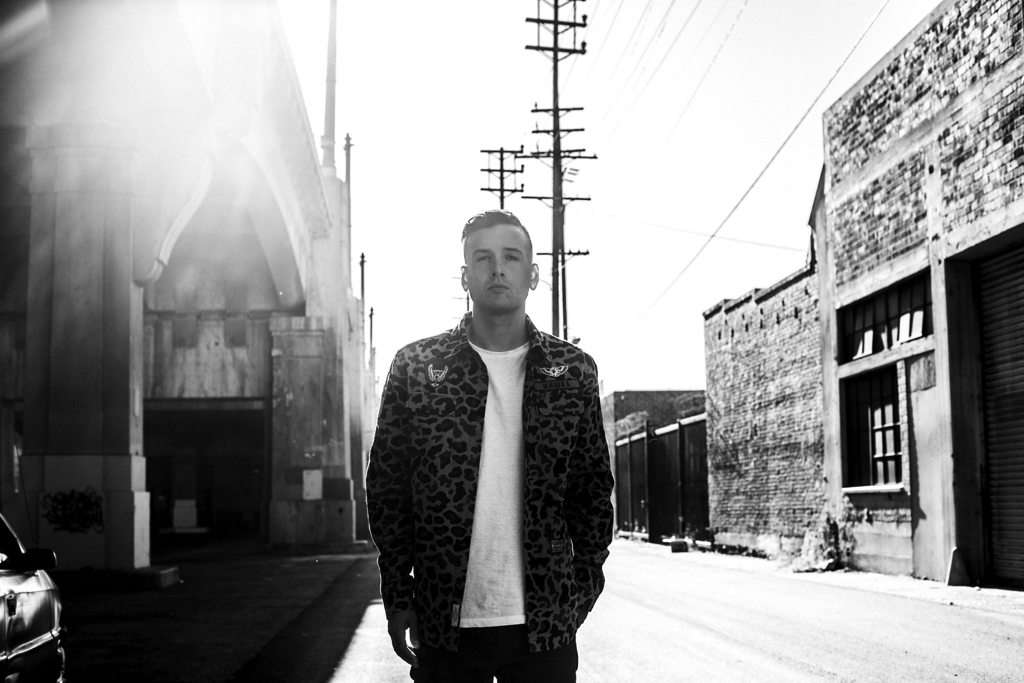Last Thursday, Los Angeles born-and-bred Stephen Bruner, better known as Thundercat, topped off his North American fall tour with a fantastic homecoming show that would make any native proud to regard him as an Angeleno brethren.
Thundercat’s latest album, Apocalypse, was recently mentioned at number 29 on Rolling Stone’s Top 100 Songs of 2013 for his hit, “Oh Sheit It’s X,” and has received rave reviews on the album since it’s release earlier this summer. An album ripe with inklings of Thundercat’s genre-versatility – due to previous stints with acts like Suicidal Tendencies and Erykah Badu – and the thundering cohesive direction from Brainfeeder brother Flying Lotus, Apocalypse was built with just as much emotion as it was with skill and talent, a feat that transferred directly to his performance that night.
Photo courtesy of Michael Melwani | IHEARTCOMIX
Photo courtesy of Michael Melwani | IHEARTCOMIX
We got to chill with the cat right before he went on to blow everyone’s minds away, and while maintaining eye contact during the conversation was a little difficult due to his Rick James-esque hair-do, talking with Stephen Bruner proved that he is everything we’ve heard about him and so much more. Check out the interview below to see what he had to say about coming home, his appreciation for Drake and how hard it is to sing and play at the same time.
LAC: How does it feel to be back in LA? Good? How was the tour?
Thundercat: Feels good, man. Feels good to be home. Anytime I leave for a long time I get weirded out cause I miss the dynamic of being at home. The tour was really tight. (laughs) It was fun, everyday was different, it was an adventure. At one point I had both of my brothers with me, and then we switched in the middle of it – it was just a lot of fun.
LAC: What was the craziest city?
T: Toronto, by far. Toronto goes nuts. The club we went to after the show was just nuts. But I do want to say that I did have a lot of fun on the other side of the states, like towards Philly, New York, Chicago, folks there were really into the show.
LAC: Anything like that New Year’s party?
T: (Laughs) No, not at all. Yeah that’s still the epic one – to this day we still refer to that party. (Flying) Lotus still gets mad about too, he was in Australia and we talked about it the other day and out of nowhere he was like, “It’s cool, we don’t have to talk about it,” and I just laughed. He missed out, he can still feel it.
LAC: Has the transition from being a sideman to a front man gotten easier as you’ve been working on your music and been on tour?
T: Yeah, it’s been a couple years since I started that whole process. I’ve still been learning a couple things about being the frontman, but it’s funny because I still get nervous when I come home. I feel like it’s too personal (because) there’s a lot of people here that are friends, and they’re all looking at me, or family’s here and they’re all like, “Oh, look at my baby!” Kinda weirds me out a bit, but it’s cool.
LAC: As your vocals styling’s have expanded, has that changed how you write your music?
T: It has a bit, I mean, I am absolutely more comfortable getting ideas out without being held back by the fact that I’m concerned how it’s going to come off how I sound. I know areas I’m comfortable with and areas I’m more willing to explore – I wouldn’t mind being pushed a bit though, you know?
LAC: Prior to, you were just writing music to play on the bass and now you’re singing and also a solo act. Is there a way you balance your expression between your instrument and your vocals as you become more comfortable?
T: Yeah, a little bit. It’s funny because sometimes I’ll see footage and if I start playing, I’ll stop singing because it’s difficult for me (to do) both at the same time. But for the most part if I’m playing something solid and steady, it’s easier for me sing. But a lot of the time with the music, we try to use improv as much as possible and sometimes they get mixed up.
LAC: So it’s almost like, once one switch is turned on the other gets turned off.
T: Yeah, that’s where it can get hairy, but I think that’s also the fun part too because it leaves the door open for other things to happen.
LAC: You’ve said being a bass player it has forced to be creative and determined in a particular way.
T: It’s aided in the melodic structure in music for me in a lot of ways. It’s also like, looking at different examples and bass players in the past as big shoes to fill, but it’s also brings about this thing where there’s this inquisitive thinking on how far I can go playing and singing. There’s a lot to it, but it’s a bit simple when you spend time with it I guess, but you really have to dedicate yourself to it. It’s a funny thing because a lot of the songs, with some of the progressions I can’t outright sing over it. Sometimes I have to literally sit out and think about sustaining my voice over these chord progressions that are going on under it.
LAC: It gets super technical to a certain point.
T: Yeah, some of these songs, I’ve gotten good when I’m singing them at home. (laughs)
LAC: Considering the wide range of acts you’ve played with – from Suicidal Tendencies to Mac Miller and The Internet – what are some of the differences when playing with artists of varying caliber and ages?
T: I mean, there are always differences but a lot of the times you just try to feel out the vibe. Everybody has different sets of emotions and things that come with where they’re at, so I try not to over or under estimate anything, I just try to find a good balance to how whatever is going to occur between us musically is going to happen. I remember when I was in Suicidal and they would always be saying to me, “You know this stuff ain’t no joke, you gotta take it seriously,” and yet it felt really simple to me. The funny thing is that most of the time, when someone can’t tell you what they’re not hearing, that’s the part that’s actually a little bit more difficult. You know, I never judge, I just try to give what I can when I’m involved.
LAC: I’ve heard that you’d love to work with Drake.
T: I think it has to do with the fact that I’m a big fan of Drake, naturally. At the same time I’m a fan of where he comes from. That coupled with the fact that hearing about he’s really in touch with how he feels with his music, no matter what anyone says, he set a trend for people – that it’s okay to be sensitive, it’s okay to be emotional about certain things that happen when before it’s always been about downplaying (those emotions.) It was just something I always appreciated about him as an artist.
LAC: Is it much of a stretch to say that Apocalypse is as much FlyLo’s project as it is yours?
T: It’s not a stretch at all. The best way to describe is that the only thing that I can think of is that I put a lot of care into Lotus’s music and I treat it like it’s mine, straight up and down. And I would hope that people can see and tell that that’s how it feels. That’s why I don’t have a problem with his say-so in mine because I know he treats my music as his too. The lines have always been blurred between me and him and it’s never been anything weird. When we first started working together, it was just like me and him watching Adventure Time, have a computer one, have like, three basses lining up and just collaborating and coming up with ideas. It was a constant, “Let’s do more,” with me and him at that point. And we try to capitalize on it as much as we can.
LAC: So what’s up for 2014? Big things? A haircut?
T: (laughs) Well the hair isn’t changing, that’s for sure. We got a long of things in the works, me and Lotus are always trying to take over the world. That coupled with a bunch of different things, a lot of collaborations, I’ve been doing a lot of work with Wiz Khalifa, Mac Miller, Donald Glover, a few more things. I’m working on a new album of course. Kind of trying to take it easy, but still be as fast and forward as I can.




